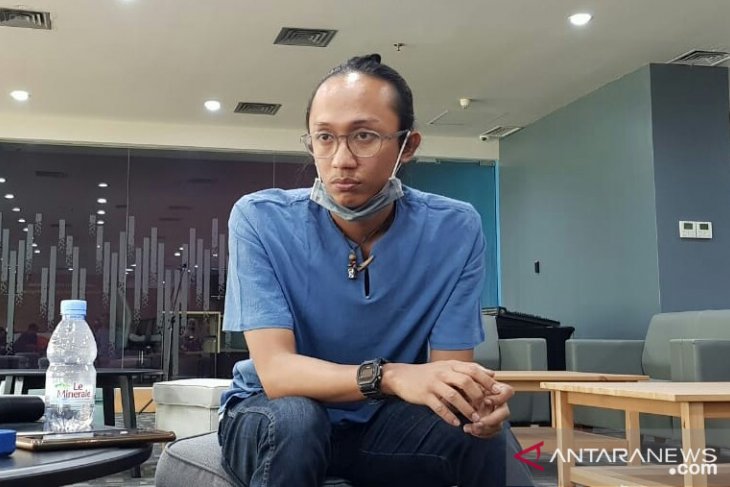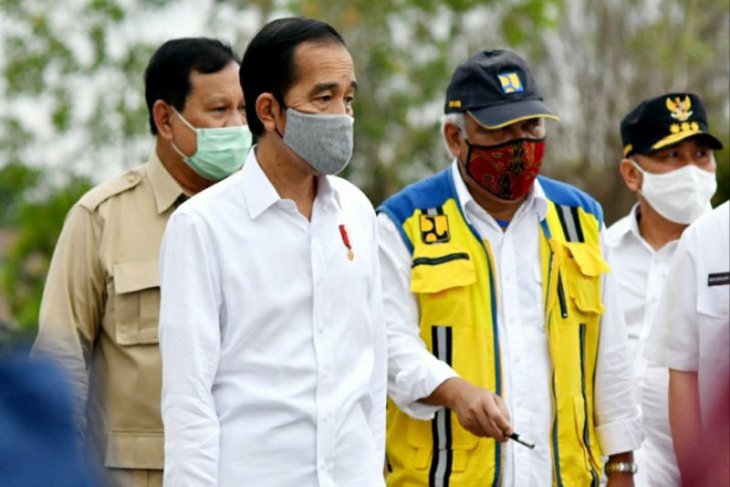Live Streaming
Program Highlight
Company Profile
July
ICW Suggests Empowering Law Enforcers for Combating Corruption
Written by Ani Hasanah
A researcher at the Indonesia Corruption Watch (ICW) Wana Alamsyah. ANTARA/Benardy Ferdiansyah/sh
Anti-graft watchdog the Indonesia Corruption Watch (ICW) deems the plan to reactivate a corruptor hunting team as unnecessary and instead suggested the government to prioritize the empowerment of law enforcers.
"Firstly, the corruptor hunting team was established in 2002. However, according to ICW's data, eight years following its establishment, it only captured four out of the targeted 16," an ICW researcher Wana Alamsyah noted in a statement in Jakarta on Friday.
Furthermore, he noted that the government had yet to publish an evaluation over the team.
According to Alamsyah, the ICW recorded 40 fugitives in corruption cases during the 1996-2018 period. "This means that we need to empower law enforcers. The policy to form a new team would spark an overlap in authority," Alamsyah noted.
Citing the arrest of Maria Pauline Lumowa, a fugitive in Bank Negara Indonesia's (BNI's) US$136-million fraud case, Alamsyah pointed out that the extradition treaty was not the sole means of capturing a fugitive.
To this end, Alamsyah highlighted the need for the government to focus on a non-formal approach to expedite the arrest of dozens of fugitives currently hiding abroad.
Earlier, on Wednesday (July 8), Coordinating Minister for Political, Legal and Security Affairs Mahfud MD stated that the government will reactivate the corruptor hunting team constituting personnel of the Indonesian Police, Attorney General’s Office, and Law and Human Rights Ministry.
"The team will work under the coordination of the Coordinating Ministry for Political, Legal, and Security Affairs. The team had recorded some achievements. Perhaps, the corruptor hunting team can also arrest a suspect when it tracks down Djoko Tjandra," Mahfud remarked.
Djoko Tjandra was sentenced to two years’ imprisonment and ordered to pay Rp546 billion (US$54 million) in restitution by the Supreme Court in 2009 for embezzling billions of rupiah from the state bailout fund during the 1998 Asian financial crisis.
Tjandra escaped to Port Moresby, Papua New Guinea, a day before the court announced the verdict. (ANTARA)
July
Regional PSBB Relaxation to Lower Mass Layoff Potential: Bappenas
Written by Ani Hasanah
Illustration - Workers in a cigarette factory in Kudus, Central Java. ANTARA/Andreas Fitri Atmoko/tom/12/sh
The potential of mass layoffs over COVID-19 is projected to decline, with some regions relaxing large-scale social distancing (PSBB), thereby facilitating economic recovery, the Coordinating Ministry for National Development Planning/National Development Planning Agency (Bappenas) stated.
"Based on the latest data, I believe that relaxing large-scale social distancing measures will boost economic activities, and the wave of layoffs is expected to decline within the next few months," the ministry's acting Head of Sub-unit of Macro Planning and Analysis Directorate, M. Firman Hidayat, remarked during an online seminar in Jakarta on Friday.
However, Hidayat opined that the economic capacity might not yet fully return to normal akin to the pre-pandemic scenario, and the likelihood of layoffs will still exist.
"I think, as long as the COVID-19 pandemic had yet to be overcome, the possibility of layoffs will still exist," he stated.
According to Hidayat, unemployment had risen during the pandemic as job openings were also lesser.
Bappenas has projected the number of unemployed in 2020 to increase by four to 5.5 million people from that in 2019, while in 2021, the number of unemployed is expected to rise by 10.7 to 12.7 million.
The trade, manufacturing industry, construction, company service, accommodation, food and beverage industry are among the sectors that will reduce the number of employees.
The agency has designed the strategy for a policy to reduce unemployment during the COVID-19 pandemic through the recovery of the manufacturing industry, tourism, investment, and entrepreneurship, as well as through the development of simple infrastructure in villages under the labor intensive program.
Furthermore, Bappenas will improve the quality and productivity of workers through the social protection system, health system, education system reform, and vocational training. (ANTARA)
July
NLPSF Researcher Cautiously Supports Indonesia's Food-Estate Program
Written by Ani Hasanah
Kitso, a senior researcher of the Palangka Raya University's Natural Laboratory of Peat Swamp Forest (NLPSF). ANTARA/HO-Dokumentasi pribadi
A senior researcher of the Palangka Raya University's Natural Laboratory of Peat Swamp Forest (NLPSF) suggested that a peatland area of depth below 50 centimeters could serve to support Indonesia's food-estate program.
"I disagree with the use of a peatland area of depth of more than 50 centimeters," Kitso, a researcher of the university's NLPSF, stated in connection with the government's plan to create new rice fields in Kalimantan to boost the country's food security.
In conversation with ANTARA news agency in Jakarta on Thursday, Kitso remarked that not all peatland areas can be used for rice farming, though the location of the government's food-estate program was in the former areas of one million hectares of a peatland project.
Kitso cautioned that if new rice fields for the government's food-estate project were opened in peatland areas of depth over 50 centimeters, it would be detrimental to the environment.
The cultivation of peatland areas, with depth of more than 50 centimeters, could also trigger the recurrence of huge land and forest fires akin to that in 1996 and 1997, he pointed out.
The central government had recently revealed its plan to expand its food-estate program by developing 165 thousand hectares of land into farmland in Pulang Pisau District, Central Kalimantan Province.
The government is sentient of the importance of boosting the nation's food security amid this ongoing global COVID-19 pandemic and beyond.
On April 21, 2020, President Joko Widodo (Jokowi) had urged officials to make an accurate assessment of Indonesia's rice stocks.
The president's directive came on the back of the Food and Agriculture Organization (FAO) of the United Nations’ warning of the COVID-19 pandemic triggering a global food crisis.
Speaking in connection with Indonesia's rice stocks, Coordinating Minister for Economic Affairs Airlangga Hartarto had earlier revealed that the country's rice stocks were estimated to reach 4.7 million tons until the end of 2020.
Hartarto informed the press following a virtual limited cabinet meeting chaired by President Joko Widodo (Jokowi) in Jakarta last May that the National Logistics Agency (Bulog) was tasked with maintaining rice stocks of over one million tons.
Hartarto noted that Bulog will absorb 900 thousand to 1.4 million tons of grains of the farmers.
Meanwhile, Agriculture Minister Syahrul Yasin Limpo noted that the national stocks of 11 commodities were forecast to remain safe until June.
The commodities comprise rice, corn, shallots, garlic, large chili, cayenne pepper, beef, buffalo meat, chicken eggs, cooking oil, and granulated sugar. (ANTARA)
July
Jokowi Visits Kapuas to Observe Site of Food Estate Program
Written by Ani Hasanah
President Joko Widodo. ANTARA/HO-Central Kalimantan Provincial Government
President Joko Widodo (Jokowi) arrived at the Tjilik Riwut Airport in Palangka Raya, Central Kalimantan, and later headed to Kapuas District on Thursday.
The head of state visited Bentuk Jaya Village, Dadahup Sub-district, to observe the location of the food estate program that is projected to boost the country's food resilience.
During the working visit, Jokowi was accompanied by Defense Minister Prabowo Subianto, Agriculture Minister Syahrul Yasin Limpo, and Public Works and Public Housing (PUPR) Minister Basoeki Hadimoeljono.
Chief of the Presidential Staff Moeldoko, Central Kalimantan Governor Sugianto Sabran, and Kapuas District Head Ben Brahim S. Bahat were also present along with the head of state during the visit.
Moreover, Jokowi and his entourage were scheduled to visit Gadabung Village in Pandih Batu Sub-district and Pulang Pisau before returning to Palangka Raya.
In the meantime, the government has planned to establish a new food estate in the country to ascertain adequate food supplies for the public under the implementation of the National Strategic Program (PSN).
Coordinating Minister for Economic Affairs Airlangga Hartarto remarked in a statement recently that the new food estate will be located in Pulang Pisau District in Central Kalimantan.
"All parties will be involved in the program. This will be a sustainable program that will benefit the nation," Hartarto affirmed.
Development of the food estate has become part of the government's National Strategic Program to be implemented within the next three years. The PUPR Ministry had earlier targeted to revive 165 thousand hectares of land as a food estate in Central Kalimantan during the 2020-2022 period to realize national food resilience.
President Joko Widodo has tasked the ministry with developing the food estate that is projected to become a new food barn outside Java Island.
The PUPR ministry’s 2020-2021 priority program aims at structuring strategic tourism areas, expediting toll road construction, boosting cash-intensive labor, and developing food estate areas and human resources.
The Ministry of Villages, Development of Disadvantage Regions and Transmigration stated that the agriculture intensification program will cover 10,594 hectares of transmigration area in 55 villages. (ANTARA)


